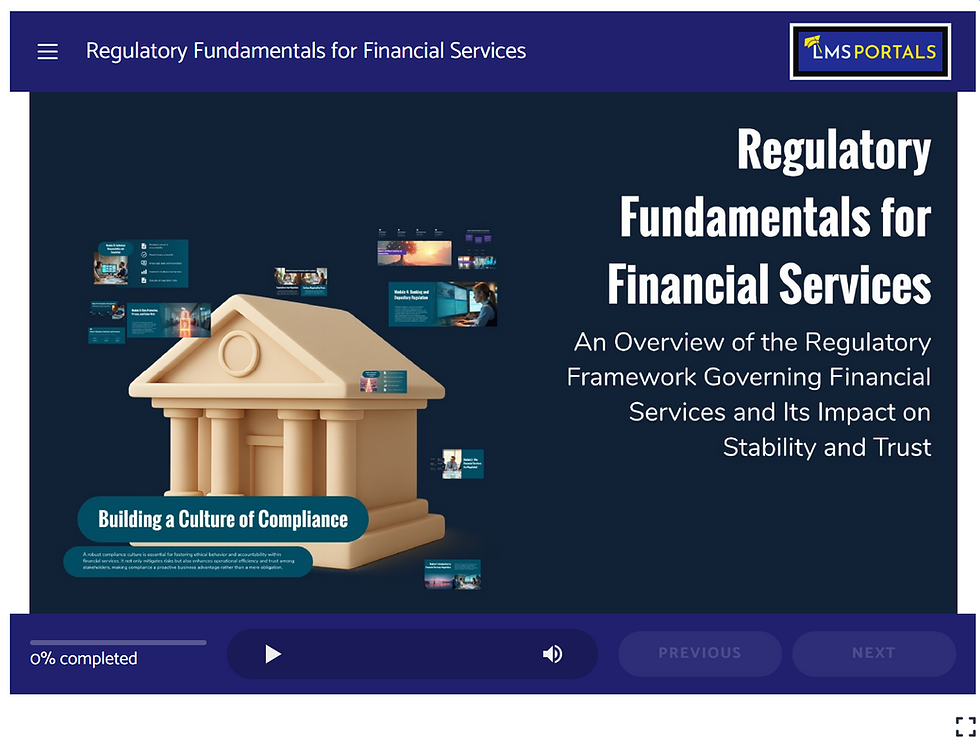Working with FCA Compliance Consultants
- LMSPortals

- Mar 9, 2020
- 3 min read
Updated: Apr 25, 2021

The Financial Conduct Authority (FCA) is a non-governmental body that functions independently to regulate the UK’s financial services industry. Established in 2013, the FCA was introduced in conjunction with a new set of regulatory guidelines and a mission to oversee the stability of the UK’s financial markets and the prudent conduct of UK financial services firms.
The FCA wields significant power, including the power to regulate behaviors related to the marketing of financial products. It can dictate requirements and minimum product standards and has the authority to conduct investigations on organizations and individuals as it deems necessary. The FCA can instruct firms regarding their promotions and can choose to freeze the assets of organizations or individuals it is investigating.
The Goals of the FCA
The FCA has wide-ranging authority to pursue three primary objectives:
Secure an suitable level of protection for consumers
Support market integrity and safeguard the UK financial system
Encourage market competition to the benefit of consumers
The FCA can create and enforce the rules to govern the UK’s financial services industry and can choose to investigate both organizations and individuals that may be in violation.
FCA Regulations
The FCA establishes and enforces the minimum standards which financial services products must maintain to participate in the markets. It can require firms to abandon or modify those products which fail to meet these standards. The FCA has the power to ban financial products for up to one year. It might then choose to impose a ban of an indefinite timeframe after that year.
FCA Compliance Consulting and Training Activities
Companies needing to ensure FCA compliance in their operations will often seek out the guidance of a consulting organization to review their operations and make recommendations to improve employee behaviors and help enforce adherence to FCA rules. The challenge that follows, is in getting your staff to follow these recommendations in the course of performing their job duties.
Staff Training for FCA Compliance
One of the most common causes of FCA compliance violations is a lack of employee awareness training to help ensure understanding and adherence to guidelines. The FCA clearly indicates that organizations should seek to build a culture of compliance to both safeguard the effective operation of the financial markets while protecting consumers.
Effective FCA compliance training is not just about communicating information, it is about adapting behaviors
Training is an important of a larger approach to building a culture of compliance
The outcome of training is to make staff members understand the compliance-related implications of their actions
eLearning for FCA Compliance Training and Consulting
For companies looking to ensure FCA compliance in their operations, a combination of consulting, supported by staff training to lead provide the greatest chance of ongoing compliance adherence.
And For those organizations looking to launch an FCA compliance training program, the benefits of eLearning (online training) can be significant, especially when compared with the costs and time demands of classroom-based training.
Unlike classroom-based training, eLearning allows you to quickly and cost-effectively launch, manage, and analyze your FCA compliance training activities to ensure that employees are performing their training activities in a timely manner and achieving the desired learning results.
LMS Portals for FCA Compliance Staff Training
LMS Portals offers a powerful Learning Management System (LMS) that allows our corporate clients to easily build and deliver FCA compliance eLearning courses and content. Our system allows you to launch your own corporate-branded eLearning portal and includes robust tools for employee onboarding, messaging, analytics, and more.
Contact us today to get started for free!



Comments